Issue Number 49, Summer 2020
Contents
- Drought by Louise Gwathmey Weld
- Life in the Suburbs by Louise Gwathmey Weld
- An Ardor for Trees by M.L. Lyons
- Tasmanian Cats by Rafaella Del Bourgo
- Monarch Epitaph by Margaret Swart
- Third World Arcadia (2019) by David Dodd Lee
- What Survives by Ed Ruzicka
- Fragment on Natural Philosophy by Nathan Manley
- Gifts by Katharine Harer
- Lick of Wildness by Laura Grace Weldon
- Last Night’s Traffic Stop by Bill Gainer
- Band-tailed Pigeon by Dion O'Reilly
- On a Walk by Eric Forsbergh
- Song by Jonathan Blake
- Watchers by Doug Barrett
- Hard To Plan For by Gene Berson
- Tea and the Traverse of Random Energy by Rebecca Leet
- Florida: The Clearing Space by Katherine Peters
- Butterfly Faith by Jessica Kulynych
- Postcard from Rio by Bruce Louis Dodson
- Climate Change, Ohio by Laurel Anderson
- Fatal Attraction by Richard Lebovitz
- Fire Season by Gowan Batist
- Dust Diaries by Lucy Griffith
- Thoughts from the Trough by Lucy Griffith
- Almost Storm by Keith Taylor
- Yes by D. James Smith
- Cattle by D. James Smith
- Bear Vigil by Wren Tuatha
- Special Pleading by Marjorie Stelmach
- Cutting the Oak by Anna Citrino
- Garter Snake by Nancy Takacs
- Sharing the Water with Thoreau by Daniel Bourne
- there is no homonym for disappearing, only by Jordan Osborne
- Campbell Creek, August 5th by Marybeth Holleman
- Sierra-Gray Moth by John Schneider
- seeds in flight by Corbett Buchly
- factious reptile & witness by Corbett Buchly
- Seeing & Believing by Dan Overgaard
- Storm Bound by Nikolas Macioci
- Song for the Pantala flavescens by Kelly R. Samuels
- Invasive Species by Russell Reece
Archives: by Issue | by Author Name
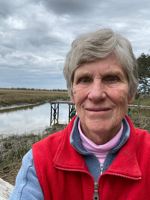
Drought
by Louise Gwathmey Weld
Louise lives on the coast of South Carolina on a tidal creek in the Charleston Harbor Watershed.

Heat downgrades ambition,
jaundices the wilting plants.
Even those who believe in the seasons are discouraged
by their own listlessness. A hot breeze flutters
the feathers of disinterested gulls.
The marsh bends before a drought of salt.
There is no river making glad the city of God,
but a steaming creek whose heat can barricade
the land from the consolation of clouds.
Musicians hear all these discrepancies as notes.
Poets feel the vowels of sweat and dig for wells in the clouds.
Novelists are shaken by the fiction of truth and write stories
with no ending. We want to believe in the view
of the river birch: it leans towards the creek and draws the sap
of current to its roots. It waits for the rising tide.
The weather forecast is for a band of storms,
wind, and hail the size of quarters,
a violence we can scarcely contemplate.
The rain we seek is neither monsoon nor cat
but rain like the relief of light in childhood nightmares.
Finally, at night, we hear it: steady, insistent,
it comes without fanfare, waking memory in all growing things,
calling out the frogs, setting the earthworms to crawl
in droves across the grass. And we fall into the dream of a play
in which we all have parts but have forgotten all our lines.
© Louise Gwathmey Weld

Life in the Suburbs
by Louise Gwathmey Weld
Louise lives on the coast of South Carolina on a tidal creek in the Charleston Harbor Watershed.

In the suburbs there are
covenants, for goodness sake
to keep us all in our proper places
our cars in their paved driveways,
all dogs on leashes, all poop in bags.
The houses don’t all look the same
but in your mind, you can’t tell the difference.
According to a pop-up sign, the mosquito patrol
has been at work down the street. Even now
the garbage truck collects all our excesses.
Except for the scraping of a new roof
this morning the predictable sounds and
comings and goings to work and school,
the lightly snoring dog. Unexpected,
the declaration of the rooster,
(loud from several streets over)
insistent that it is morning and the hens are laying.
There is no quieting his screech and cackle.
All fences insufficient, the air acoustical
with his narcissistic racket. We all have to deal
with the intrusion of him. Indignant— ‘For heaven’s sake,
this is not the country and aren’t chickens against the rules?’
He rattles the air with all the sounds of love and loss
he’s the Prophet of Rabble-Rousing in the kingdom of calm.
During the night some critter has gnawed a hole through my porch screen.
Even now, a loud-mouthed sparrow is clinging
to the same screen, scratching its way in.
© Louise Gwathmey Weld

An Ardor for Trees
by M.L. Lyons
M.L. Lyons lives among the forested wetlands of the Tualatin Valley, where the Tualatin River flows through a mosaic of agricultural and urban land to the forests of Oregon's Chehalem and Coast Range Mountains. Given its many bends and twists, the river was named “Tualatin” or "lazy river" by the Atfalati people who lived in the Tualatin Basin before European settlement. The Tualatin watershed also sustains such native plants as Fireweed, Aster, Red Columbine, Yarrow, Kinnikinnick, and Beach Strawberry.

Four hundred and sixteen million years ago the first trees emerged in the force of sun and the softness of rain -- the great canopies of the Devonian Forest. Palm-like fronds, simple in structure, but profound in their origination, transformed this world with each branch. They absorbed the carbons from a previously toxic-laced environment and released immense new breaths of oxygen. And with the shade of these great limbs, the oxygen that permeated and the matter they created, this planet became able to sustain life as we know it.
Every animal that swims, slithers, crawls or leaps depends on the prone stillness of trees. In and of themselves, trees are pure growth. Seeds germinate into sentinels that seek the sky, flexed heavenward. Trees abound with creatures yet emanate a solitude that pervades even their lowest branches. This strength in silence and power in stillness makes us consider what is the fellowship of branches, what is held within while being so singular. Ultimately we have chosen trees as a metaphor to describe ourselves. The family tree, burgeoning with life, winding its way down to a single trunk. A singular self, solitary yet descendant of so many bodies, so many branches.
To humans, trees are as emblematic as illustrations we draw of our bodies—from our crown to our legs. Even our minds are dark, forested inscape—full of dendrites spread within and receptors of the world outside, creating the great branches of memory traced within our skulls. Each tree manifests its own unique shape, a singular architecture of itself, a self-creation shaped by circumstance and conditions all accidental or fated. Rather than bear our resemblance, perhaps it is we who bear theirs, for these creatures hold greater mysteries—their entire selves endlessly useful to so many, their function and nature sustaining to all things.
As humans we describe fallen trees as tender nurse logs providing a seedbed for further life, each seedling cushioned by lichen and moss.
It is precisely in a tree’s stillness and its prone growth that we as wanderers and gatherers on this Earth should reflect. Trees of life. Trees as life itself. They were the first bedding, the first fruits, the first safe place that we in our various manifestations ever experienced, whether we climbed down from them with our gangly limbs or lifted ourselves into them with a firm hand. They gave us scope and height we could never attain otherwise, and when there was no landmark to show us the way, we climbed their branches in order to see where we were and what lay ahead. Our first sense of effortless movement towards the sky was not with wings, but in the branches of a tree.
We who are so bound by gravity, who struggle to resist and yet seek to fly, strive endlessly away from this earth... we do not share the wisdom of trees. They offer the lesson of how to remain, how to stand in one place and to sustain yet reach upwards. To be in one place, and find strength even in the most adverse circumstances, this is their nature. Trees are rooted in the most beautiful sense—suggesting some hidden cause or source, ancient in age and rarely turned over to the human eye, a source that is hidden under the everyday, beneath the very ground we step on. These ancestral depths are a tree’s nature. Even its roots can reach unfathomable distances, down hundreds of feet to places we cannot see.
Among us, they are the quietest of companions, the silent millions which wordlessly accompany us during our daily lives. Alone in a field, flanked by a yard or gathered in unison, trees are the great collective that has no tribe. They settle soundlessly and without great fanfare. Upon last count, three trillion of them still inhabit this world, and when we break down the numbers, for every man, woman and child who breathes at this very moment, there are 61 trees that breath for us, providing an alchemical counterpoint to all our restlessness. All those relentless passions for our needs, our wants, even for each other, cannot be sustained without them.
It is natural then that everyone should fall in love with a tree at least once in their lifetime. Preferably more times. A love of trees is the most innocent yet instinctive of all loves. And it is now, perhaps more than ever, that we must find ourselves most rooted in this love in order to sustain this moment and all the moments which follow, this place and all the places we have seen and those we will never see.
© M.L. Lyons

Tasmanian Cats
by Rafaella Del Bourgo
Rafaella lives between the coastal hills and the San Francisco Bay with her husband and one spoiled cat. Along the back of their property line, a row of Italian cypresses plays host to birds and squirrels. Underneath this urban neighborhood runs Potter Creek.

When we arrive for our year in Tasmania, we borrow Renta Cat from a city friend to rid our country house of mice. She quickly does the job. Her reputation spreads. The postmistress across the road tells everybody in the village of Lower Longley.
The dairy farmer from up the mountain comes to borrow her, though I say I cannot guarantee performance. He returns her with tales of an animal run amuck -- seven small deaths in just one hour. Me and the missus, he says, most grateful. Gave her a dish of cream.
Often we wake to marsupials on the back deck. Very dead. Always decapitated. We try to match the wet and bloody carcass to the photos on our “Marsupials of Tasmania” poster on the kitchen wall – possums, bandicoots, and quolls. We try to imagine hopping or scuttling. The shape of ear and snout.
Also on the poster, our favorite, the Tasmanian tiger. About twice a year, someone calls the Launceston Museum, says, I’ve seen one but I won’t tell you where. Seventy pounds with a rear-facing pouch, considered a threat to the introduced sheep, the tiger was hunted to extinction with dogs and guns.
The creatures Renta brings us are small, often babies. One of us lifts the limp body to give it a formal burial among the other graves we’ve marked with painted stones. We try not to think about the frantic mother left behind. We try not to think about what we will find next week. As we dig the hole, Renta sits near the corpse and grooms herself.
It is mid-morning. We stand, heads bowed, then return to the house for brown bread and butter, and jam from the English blackberries growing out of control along the south fence.
© Rafaella Del Bourgo

Monarch Epitaph
by Margaret Swart
Margaret lives in interior Alaska, where her neighbors include moose, gyrofalcons, ravens and the occasional porcupine seeking raspberry leaves.

You were billions—
bursts of chromatic orange—
black filigree painted on poetry—
flirtatious flight—
A mystical marvel
migrating from Mexico—
swarming our milkweed—
laying your pearl eggs—
hatched fatling larva
gnawing consuming growing—
suspended in chrysalis
comb of transformation—
aborning wings antennae legs—
Friendly pollinator
in our essential gardens—
landing on our shoulders palms hair—
air held because you dared—
Too intimate a count now—
instinctive mourning—
aerialist near erased
by indifferent spray—
© Margaret Swart

Third World Arcadia (2019)
by David Dodd Lee
David lives on Baugo Bay, a series of canals surrounded by wetlands, where the St. Joseph River and Baugo Creek meet close to the Indiana and Michigan border.
1.
Guilt, by association, everywhere—scorched patches on the lawns
due to too little moisture.
I cough dry pollen. A TV swings
its oblong dream. No. Just no. Road closed.
“Black and gold fish
are mixed in with the usual gray ones,” he mutters, holding a spear
and gathering an aspect of the green water with his gaze . . .
2.
In one direction the drip of
rainwater off formerly
rain-dusted plastic piping along the highway, in the other
African sand moiling the blue
to a haze overhead.
The earth won’t stay put on the other side of the planet.
3.
107° in Evansville in June, a Thursday . . .
A sunset expresses itself, the usual bending of light—
gas molecules—an expanse of blue now ribboned to maroon
over I-69 . . . Our days are numbered. They spiral back at us
out of huge greenhouse ventilators.
Red sky at night,
she notes, caustic . . .
Wavelengths come swimming across the algae-scuttled water . . .
4.
We stand on the shoreline
kicking away spilled diatomaceous earth.
Mud puppies are gorging on fish eggs in the shallow water
underneath the railroad trestle.
5.
There wasn’t anything left but chaos, a uniform unraveling.
Predictable unpredictability a vanishing romance . . .
Data points smoldering under the bark of the birch trees.
The eight-spotted forester moth dragging its burning wings home
(“hopeless”) . . .
Blood spreading, a swarm, across the highway centerline
attended by a turkey vulture, maybe a black crowned night heron . . .
Everything, from the tops of cellphone towers on down, begins popping like heated-up tin.
Each child’s finger printed, then dropped into an orange juice can.

© David Dodd Lee
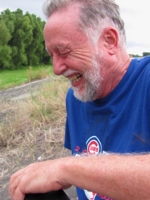
What Survives
by Ed Ruzicka
Ed lives less than two miles from the banks of the Mississippi River in a landscape dominated by thunderous downpours and sudden floods that tax the Amite and Comite River watersheds. Baton Rouge itself has miraculously untainted drinking water drawn from the Kentwood aquifer which runs 1,500 feet underground and originates in Canada.

The six creeks that drain this city are periodically
cleared to insure that heavy rains get swept away.
Laborers yank apart jammed branches where turtles perch
and plastic bags snare. Workers haul out tires, planks,
break up dams from which moccasin and blue runners hunt.
Minnows dart around rubber boots. Before their advance
kingfishers and egrets reposition themselves along the bank.
Rusted culverts, dryers, golden rod, vines, bamboo.
A few blocks from our house the creek runs green-grey
except at night when water segues to black.
Under moon: coyote, skunk, racoon. They leave thin
paths trampled through thorn and scrub but a man
needs a machete or at least a strong stick to force
his way through bramble along mucked bank.
At points creek slopes have been reinforced by a scrabble
of shattered pavement, massive, silt-settled slabs.
Less and less any wandering boys. Less and less the squeals
of children. Hub caps, homeless men, things dislodged.
Behind Broadmoor Junior High, just above where a tributary
crashes in, is a dandelion knoll sequestered enough for teens
to smoke cigarettes and to offer their virginity up to an imperfect
wilderness. Owls, lichen. Stars upside down in the pitch of night.
© Ed Ruzicka

Fragment on Natural Philosophy
by Nathan Manley
Residing for now among the mixed deciduous forests of the Merrimack River watershed, Manley pines for the arid landscapes of the West—for cottonwoods and peachleaf willows, Platte-nourished; for pronghorn and prairie grass; for the great backbone of the Rockies, crowned at intervals with Precambrian rock half as old as life itself.

<...>
and we christened it the vivarium:
an enclosure we cobbled from scrap wood
and screen wire. In a spell of listlessness
such as only torrid Summer produces
in schoolchildren, we designed the capture
of the orb-weaver whose gossamer lair
hung glistening and taut beneath the porch.
<...>
<...> rustle of heat <...>
we conspired <...>
chittering grass and the scent of blown silt
<...>
<...> infecting our [play], the microscope’s
<...> tenacity and [violence]
<...>
We cupped grasshoppers in our naked hands,
wherein the tickle of their singing limbs
excited mirth and laughter. With the air
of a technician, one of us then grasped
the hind leg of an insect, peeled, wrenched it
backward and off—force for which the creature
offered no greater censure than a twitch.
Quietly, the question of cruelty
stretched like a net between us, sunk into
a taxonomic slump; in the clear lymph
that pooled about the oozing wound, we probed
questions of blood, and we ordained, at length,
a fate for our newly hobbled captive.
We crept below the deck, paused, and cast him,
flailing, into the spider’s web—bright nerves:
a system inflamed with [motion] <...>
Teased from its hidden rest among the boards,
the weaver, with all the alacrity
of an electric signal, leapt across
the quaking strands of silk which stuck and seemed
to sting <...>
<...> a [struggle]
and a silent husk. We secured the beast
in the distraction of its frenzied glee
and confined it behind walls of wire mesh
in the vivarium. There we kept it,
catalogued with crickets <...>
in my father’s garage, perhaps a week,
perhaps <...>
<...> if memory fails,
<...> was it left like [knowledge]
<...> ‘til now to hunger in the dark?
© Nathan Manley
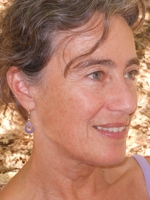
Gifts
by Katharine Harer
Katharine lives across the water from San Francisco, where she is surrounded by green hills that are home to coyotes, deer, bobcats, skunks and raccoons. San Rafael Creek originates in the hills and flows into a canal in the center of town and continues on into the Bay, and bright, white egrets, ducks, and shorebirds come to the wetlands to feed and nest; in winter wild Coho salmon spawn in local creeks.

Small, pale green with stripes, squash
holding fast to their prickly vine
Michael next-door started it
never meaning for it to become mine.
Caravan of leaves, huge deep yellow flowers
stomping the lettuce, bending the tomato plants.
Everywhere. In the way. Tough and sure.
Come on, I whisper. Keep coming.
Gridlock on the pathway
I trip over the hairy-legged creeper
lift the umbrella-leaves
looking for dinner.
“Volunteers,” I tell my husband.
Gifts, I think.
A car that runs, a roof that doesn’t leak,
a body that carries me
into the nectar-touch of water
the length of the pool and back.
The world is not right. Don’t think I don’t know.
A second vine appears.
I make soup. Pale orange. Velvety.
© Katharine Harer

Lick of Wildness
by Laura Grace Weldon
Laura lives on a small Ohio farm where rain rushes toward Little Sweetly Creek, enters the Black River, merges with Lake Erie, and then the St. Laurence River on it its way to becoming the ocean.

I see a snake sidle through grass
in a moment’s hushed quiver.
Find muddy fox prints by the coop and glance,
swift as breath, for a red blink between trees
before counting 36 hens safe on their roosts.
Hear an owl speak, another respond.
The moon’s shy cheek wavers on the pond.
What I don’t know is vast,
but enough to walk back inside
and leave the night to its own rejoicing.
© Laura Grace Weldon
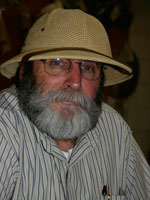
Last Night’s Traffic Stop
by Bill Gainer
For more than 30 years Bill has lived and worked in the Deer Creek, South Yuba and Bear River watersheds of Northern California.

Got pulled over
lights flashing
badge polished.
The cop –
a kid –
wanting to know
if I knew why.
Nope.
He said,
33 in a 25.
There was a lecture:
focus
being safe
rules.
Looking to the heavens
I said
It’s a Blood Moon –
son.
At almost seventy
I’ve never seen it
ever.
This is the first time;
it’s beautiful.
He let me off
with a warning.
Said in the future
pay more attention.
I said I will Officer
I will.
© Bill Gainer
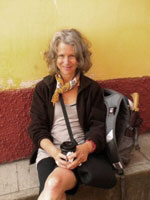
Band-tailed Pigeon
by Dion O'Reilly
Dion lives in the Soquel Creek watershed on a stream-cut terrace covered with a thin mantle of alluvium on a ten-acre triangular plot between Soquel Creek and its tributary, Love Creek.

I stand in the searing heat
in my beat-up robe,
ready to fill the depleted feeders,
with bags of mealworm, millet,
black-oil seeds, and suet—
when I see it— big as a boot,
wings beating like a raptor—
as it drops to my dried-out garden,
scattering the chickadees and bushtits,
sending up a pulse of quail.
White crescent on her hind-neck
and a block of pink-checkered shine,
she turns her nape to the sun, shows
her dove-gray chest, palest rose
like dusty silk.
So like a passenger pigeon,
for a minute I think Miracle!
A Lazarus bird has returned.
Sixty years living here, I’ve never
seen this city-hater hazard flight
out of the buckeye poison and tick trees
where they gather and thrum,
weave sticks nesting single eggs,
the yolks scavenged by jays,
their hatchlings, murdered and switched
with changeling cowbirds.
Look what it’s come to—
kids grown, my father dead,
a mother too old to hate,
two husbands gone, memories
of a lover slivered in my gut
like shards I can’t work out.
Waiting for another clumsy visitor
from a place I thought was empty—
cousin to a glowing steel-grey ghost.
So fearful and so hungry.
© Dion O'Reilly

On a Walk
by Eric Forsbergh
Eric lives in the Chesapeake Bay watershed, close to the confluence of the Shenandoah River and the Potomac River. This area is included in the Piedmont region of Virginia, lying between Great Falls, Virginia, and the Blue Ridge Mountains.

An effervescence of breeze
through tree leaves
lengthens my step.
Clouds crowd in.
Abrupt, a swath of white wings
lands in stride, folds
- impossible origami –
into an egret. Gusts uncoil to
serrate a pond’s surface.
Along its edge: black stalk legs,
a slender step, the sharpened yellow
pencil of a beak, the raindrop eye.
A slow elegance with
a quick efficiency for frogs.
© Eric Forsbergh

Song
by Jonathan Blake
Jonathan makes his home in central Massachusetts along the Quaboag River.

The loon’s cry:
Even the man
Counting coins
Raises his head
To listen.
© Jonathan Blake

Watchers
by Doug Barrett
Doug lives in the Carson River watershed where the Great Basin sagebrush sea laps up against the Sierras.

Through willow mazes near impenetrable in noonday August heat
cuts the canoe, voyageurs seeking passage to the lake beyond.
Movement on the bank ahead. Back-paddle
and halt. What danger?
A horse's head appears, emerging to investigate the intruders
and then another, and another.
More horses, half-hidden, rest in a willow thicket
all of them wild.
Five sorrel mares walk out and quietly display themselves
curling upper lips in delight as they drink.
Five sorrel mares observe their observers—
how rare to see humans, and so close up!
Watching with sidelong horse sight, never all drinking at once,
the mares listen to the murmur of voices over water,
to the clunk of paddles against gunwales
to the slurp of paddles dipping, holding the canoe in place.
Connoisseurs, they catch the savor of sunscreen
worked into paddle handles, and the bouquet of human sweat.
How long will each group stay still and stare at the other?
Who has the most time to spare?
© Doug Barrett

Hard To Plan For
by Gene Berson
Gene lives in the northern California foothills in the Yuba River watershed. Everyone goes to the river. Like a temple, with its falls its rapids its green pools, it seems to restore everyone in a personal way. We feel our kinship through it.

Outside the tire shop waiting room
a sparrow underneath a faded Subaru
sips from a puddle of condensation
dripped from the air conditioner.
Smoke from the fires is everywhere.
“Have a seat.” The young woman
behind the counter takes care of business:
“I’ll get’m right on it!”
The dude next to me into his phone
scrolls through pics with his expert thumb
an older lady across from me
fidgeting with the clasp on her purse
looks at me, her face full of apology.
I smile, and look away.
The tire shop is full of the smell of new tires.
We have Coffee Mate and hunting magazines
as we wait, and are grateful to have made it
and not to be stuck on the side of the road.
I look out the window again.
The sparrow stays
in the shade under the bumper
her beak open for the heat
as if she’s trying to sing.
© Gene Berson

Tea and the Traverse of Random Energy
by Rebecca Leet
Rebecca is fed in every season by her relationship with the old white oak that shades her patio, a much-needed solace since she lives only two miles from the Pentagon in the Chesapeake Bay watershed.

As I dribble milk into morning tea,
a filament of random energy
zigzags through my brain – slipping
between the need to buy broccoli
and the need to change oil in my car –
and awareness of my mortality
shimmies forward. One day, I will dissolve
into mere molecules, indistinguishable
from those of the oak shading my patio.
Sifted together, we’ll become sister shares
of a new organism – like threads in a carpet,
interwoven, impossible to see where one begins
or ends. Linked inextricably.
Just, of course, as we are now.
© Rebecca Leet

Florida: The Clearing Space
“The owl of Minerva spreads her wings only with the falling of dusk.” 1
by Katherine Peters
After years in the subtropics, Katherine recently returned home to the Maine woods of her childhood. She lives next to Lake Arrowhead off the Little Ossipee River, where her walks under the trees yield encounters with eagle, osprey and curious deer.
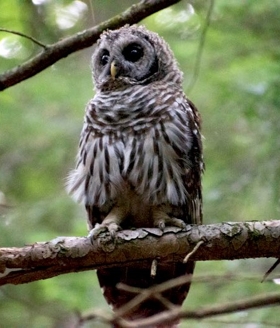
A few days ago I woke up to men with machines clear-cutting the copse of trees behind my house – an incontestably wild place, despite its small surface area. To the tune of roaring chainsaws and brusque shouts they felled trees, snapped vines, ripped out aerial roots, dragged bracken free from their tangled meshworks, leaving only a bare sandpit, an upwelling of grey dust crawling with fire-ants – desert isle with a scorpion sting – ringed primly round with citrus, ficus, palm.
My favorite tree they left standing but only just. The tree, which I’ve tentatively identified as a ficus, 2 has grown up against the ten-foot wood fence separating my miniature wilderness from the neighbor’s trim lawn. The tree is made of three crooked trunks emerging from a single bole, each encircled by a tangle of snake-thick vines. At around fifteen feet the trunks branch, arching up and outward in the direction of my balcony, dividing unevenly into a welter of tapering twigs; at twenty feet each twisted arm and crooked finger come together in cumulative grace, igniting in a canopied chaos of waxy leaves, their deep green catching at the light. Spanish moss, ghost epiphyte, haunts every gap in the crown; jessamine vines trace solitary leaf lines uptrunk, then split and spread within the verdant net, complicating its shades, foliage curling delicately round foliage, erupting in butter yellow trumpet blooms in early spring.
The weave of branch, leaf, and vine extends roof-like overhead, so that when I lie back on the rough wood of my balcony I can play “I spy” with my living ceiling. It teems, even on the hottest days. Scrappy subtropical squirrels enact their endless acrobatics, their games fiercely earnest, pointless and necessary; the bloodred cardinal coyly poises in his niche (he wreaks havoc on my succulents and I let him, just to be near the feathered flicker); and, when I stay out past dusk, the barred owl, snow-pale smudge against her shadowy recess, shivers and hunches, her uncanny call piercing the dark.
But they came 'round in hard hats and neon vests, with beer-swollen bellies and sweat-satin shirts, and took saw to bark, axe to bole. The canopy is gone. My tree still stands: three long stems, white circles scarring its sides where its boughs once breached. The crown has been cut away so as not to encroach beyond its contained perimeter. The neighbor tells me it’ll grow back fast, something about the subtropical weather. He tells me it was necessary – the roof of the duplex in danger of molding from the excessive shade, seasonal power-washes being expensive. Now the sun blazes and little maintenance is needed to prevent collapse. A matter of economics, the man tells me, good for everyone living under the roof. But no one asked me. Vaulting gone, my shelter taken, I discover within, a clearing space.
The tree will grow, but its timetable and shape refuse calculation. For now the sun beats fiercely down, making my balcony unbearable at noon. And the barred owl hasn’t found her way back; she’ll have a difficult time finding a branch with suitable recess.
Still, I leave my door open at night, listening to the crickets’ alarm and the blaring silence behind it, waiting for the owl’s call. Sometimes I try to describe it, the cry, but it doesn’t feel possible. A punctuated rhythm. An unearthly stuttering surf slipping into uneven crescendo, the plaintive wave up into against groan and slur, then descent into a muffled close, etched with adenoidal edge. It leaves that unfinished feeling—triumph stitched with awe. The peripheral sound has its echo in dusk’s shape-shifting shadows, coordinates in the darkening at which we slide into night sight.
As I lie, tangled in bedsheets and tendrils of heat, staring down the empty dark, the memory of that sound roots, turns, twists inside me. Luminous, unanswered. Perhaps I will hear it again, as I heard it once: the knowledge clutching at my core, sudden and annihilating, that nothing could affect me more. And she will again keep her late watch, calling into the night.
____________________
1 “Die Eule der Minerva beginnt ihren Flug in der Abenddämmerung” –Hegel
2 Thanks to the clear-cutting, I’ve discovered the polycephalous nature of my tree: part-ficus, part-hardwood. Ficus are hemiepiphytes, beginning life in the crown of another tree in a relationship of mutualism. They are beautifully adaptive. Their “vines” are in fact aerial roots, now creepers and climbers, now supports for their host tree’s branches, now a circular sheath for its trunk, now voyagers reaching down from their great height to root themselves in permissive ground. Now developing lungs to breathe during flooding. Under certain conditions certain species can become parasitic, the vines quietly encircling and then strangling their host, the single ficus becoming an elaborate forest of uninterrupted ficus. It is unclear what kind of ficus this is or may become, whether or not it will consume its partner.
© Katherine Peters

Butterfly Faith
by Jessica Kulynych
Jessica lives in the Farmington River Valley, tucked between the exposed bedrock of West Mountain and the sheer traprock of the Metacomet Ridge.

It has been a delightful day, but I am worried, for I suspect this one will not survive. I pull the worn wooden chair away from the table and sink into the seat. Leaning forward, I rest my elbows on the scratched surface of the maple tabletop, palms together, fingertips just grazing my lips. I’m not praying, just watching, staring at the finespun pupa dangling from the canopy inside the butterfly cage. Ebony and orange wings are visible through the paper-thin chrysalis that has, over time, transformed from a jade green, gold-beaded jewel to this delicate transparent skin. Another butterfly emerged early this morning, breaking through the onionskin and unfolding its majestic wings. My children watched with delight.
We don’t pray at our house. We have no sanctified texts to explain the mysteries of the universe. Instead, we, like Thoreau, take to the woods. I have carried all three of my children into the woods. In the womb, in an infant carrier, in a backpack, toddling along, these walks are as much a ritual as any religion. Every year, in late summer, we scour local fields and meadows, flipping the wide yellow-green, leaves of aging milkweed, searching for the bumblebee striped monarch caterpillars hiding beneath. The caterpillars are lovingly carried home in shoeboxes and lunch bags on milkweed leaves dripping creamy sap from their broken stems. Once collected, they are laid inside the butterfly house, a sliver of wildness to ruffle our predictable suburban existence. The children feed them daily, fresh milkweed sprinkled with water, for the waning weeks of summer. In recent years their discoveries have been unnervingly sparse, but this year, caterpillars were abundant and a row of chrysalises hangs from the roof of the venerable butterfly house.
This morning, all morning, my four-year-old, the youngest in the family, kneeled on a chair, rested his elbows on the table and watched the nascent butterfly, its diaphanous legs grasping the remains of its papery womb, its wings drying in the warm September air. He had lived through butterfly hatchings in previous years, but this was the first year he was interested, captivated, putting aside his toys and sticks and rooting himself in front of the house. As luck would have it, he awoke just in time to watch the butterfly emerge, and he was hooked. The wings must dry for hours, and he stayed for hours, occasionally wandering off but always returning. Later, when the sun had warmed the garden and the new creature had begun to wave impatiently, I held the wings and we took it outside. I placed the newborn butterfly onto his outstretched hand and watched his eyes open wide and wider as the monarch flapped and preened on his fingertips. Cautiously, he carried it toward a cluster of red zinnias and golden black-eyed Susans, emitting a small gasp as he watched it rise from his hand, alight on a flower and then ascend into the wild.
Now, I stare at the second dark chrysalis. It was spun before the one we released this morning. It has dwelt in metamorphosis for two full weeks. The morning was magical, but now, in the late afternoon, something is not quite right. I stare at this tiny dark jewel of wildness on my table and wonder about the danger. The wild is breathtaking and beautiful, but it is also messy and unpredictable. It does not conform to human desire. It cares not for our fears. It is indifferent to our dread, to what we despise, what we are tempted to hide, step around and ward off. These things we fear are, along with the moments of inspiration that beckon to us, part of a great wild everything that we only imperfectly understand. I grapple with this relationship. Can I find sacred not just the beauty and the birth, but also those things that frighten and repel me? I love this wild world that is not of my making, that exists outside of my judgments but houses me nonetheless. I am human, yet even the cells in my body are wild.
I want to accept impermanence, yet sometimes still I seek to soften the blow. I am saddened as I tiptoe out of the house one spring morning to collect the stiff body of a mother chipmunk, mindlessly killed by the family cat, knowing that the tiny young chipmunks my children have been observing for days will now starve inside their once cozy burrow. I am dismayed as I search, a few years later, for that very same cat, finding only a few bloody tufts of hair and the footprints of a pair of coyotes who reside in the narrow woodlands and abandoned farm fields of my suburban New England town. I am attentive to the wildness around me, yet still I am startled and shaken when my protected cocoon collides with the immense wild. To this day, I cannot erase from my memory the thudding crunch of a young buck smashing into the grille of my car, its impossible leap across a dark road aborted by two tons of metal. And, I am humbled when reason fails and explanation eludes as something in this wild world goes inexplicably, grievously wrong. So humbled, I stand and stare, in the darkest part of one summer night, unable to avert my eyes from the globs of bloody tissue, matter that once promised to be a babe, swirling around my toilet bowl. It is all wild.
I sit back. The chrysalis is moving, the butterfly emerging. I hesitate, then call the children. This is the only god I know, this wild god of life and death, beauty and dread, inspiration and pain, all mixed up so that we cannot discern one from the other, and I want them to know it too. They all watch. The butterfly struggles out, slowly, weakly. They can see that the wings are deformed, twisted. It is alive, but it will not fly.
I wonder what happened inside that chrysalis. Why are some creatures able to endure the suffocating cage, to die and emerge, re-born? Why are others marked and scarred, unable to transform, to accept, to survive? It is a mother's question. Why do some children thrive and grow, and others wither and die?
The younger children are quiet. I let them watch, knowing they need no explanation. They are scientists, sages, doyennes, connoisseurs of cruelty. They know death in their own childish way. They are morbidly curious, quiet and respectful but not afraid, not looking away. They scrutinize the unfolding, unflinchingly soaking up its defects and flaws, just as they sat on their haunches not a week earlier, hunched over the brittle, belly-up body of a mole, poking at its tiny fingers and bloated bowels with a stick, before scampering off to skip stones across the pond. They are, blessedly, not yet old enough to wonder at the life of the mole.
I look at my firstborn, now twelve, no longer a child, her own body blossoming, unfolding. I see the hint of a grimace on her face, a first whisper of understanding, of questioning, of wondering why, a first hint of knowing that the flip side of this glorious morning of baptism is the elegiac afternoon. Death is life; life is death.
The younger children take a last long look.
"What will happen to it?" they ask.
I hesitate again, holding onto the silence for a moment. "We will take care of it," I assure them, "and, perhaps tomorrow, others will hatch." They are satisfied and run off to play. I look at my eldest. We carefully open the house and lift out the deformed butterfly. It is weak. We are not wild enough to let it linger in dying. We are human, possessed of human sadness, regret, pity. We choose compassion, place it in a plastic bag and lay it in the freezer.
© Jessica Kulynych

Postcard from Rio
by Bruce Louis Dodson
Bruce lives in the Dalarna River watershed, surrounded by white birch trees and a surprising variety of mushrooms that appear in the fall. When winter comes meandering deer leave tracks in deep snow.

Dusty candles stuck in cola bottlenecks along the curbsides
Flicker nervously against the evening traffic
Sea breeze flavored with the scent of ethanol exhaust and lipstick
Little altars set by fire plugs, street-side tree trunks
Doorway entrance steps and stop signs
Offer small protection.
Cigarettes are left
A bit of candy
Shiny coins . . . still new
Unspendable
Made worthless by spectacular inflation . . . time and place
Small offerings left for spirit gods displaced by fire and greed
Their forests gone forever
Forced to live upon the streets of Rio de Janeiro
With their people sleeping on the sidewalks
Homeless servants, petty thieves and whores.
These ancient spirit gods are angry
They will have revenge.
© Bruce Louis Dodson
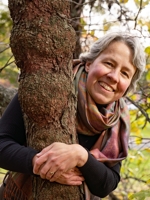
Climate Change, Ohio
by Laurel Anderson
Laurel lives in the Upper Scioto watershed half a mile from the Olentangy River on the traditional lands of the Lenni Lenape people.

Day blazes toward golden honey noon.
Purple coneflowers stand stiff, stare at the sun
waiting for absent bees.
The river gorged last night
on four inches of dark rain
and now remembers ocean
as it rises and spreads silver
into the woods along each shore.
Trees hike their green skirts high
as they begin to wade the cornfields.
© Laurel Anderson
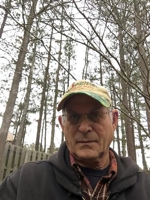
Fatal Attraction
by Richard Lebovitz
Richard lives in the Upper Chattahoochee Watershed in the Georgia Piedmont. His small backyard is a National Wildlife Federation (NWF) Certified Wildlife Habitat and Georgia Native Plant Society (GNPS) Certified Native Plant Habitat, and he participates in GNPS rescues to save native plants from the path of development.

Moths flock from the darkness
flailing their fragile wings
against the bare bulb
of the porch lamp
as if trying to break through
to the bright inside.
In daylight I find them,
tiny navigators of the cosmos
disoriented on their journey
by this uncharted beacon
and now strewn like petals
on the bare porch floor.
© Richard Lebovitz
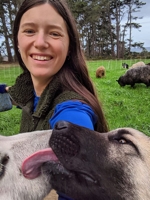
Fire Season
by Gowan Batist
Gowan lives beside the Pacific Ocean south of Noyo where she co-owns and manages Fortunate Farm, located in Jug Handle State Natural Reserve. There she helps raise sheep and chickens, grows vegetables and flowers for sale at a farmstand and farmers' market, and offers yoga, camping and a wild and scenic wedding venue.

The biggest, boldest lion I've ever seen is with us, and the community needs to be watchful. This is the dry time of year, the hungry time. The kittens are gone and made a racket on their way out. The deer are wary. The mothers are depleted and bold from desperation.
We lost two animals in two days. Due to dogs and humans, neither fed the lion. Each failed attempt ratchets her urgency higher. Yesterday morning before dawn, she came back three times to try to reclaim the doeling she had killed. Three humans and three dogs yelled and drummed at her and she stood her ground, less than 20 feet away. I spent time staring into her eyes as the sun rose, holding her gaze with my flashlight. In the grey daylight she was finally chased away by a horn blast and charge of dogs and beating drums.
She came back and killed again yesterday afternoon, in a quick dash, but was prevented from eating by the dogs. Last night a big group of community came to walk the sheep to a smaller, closer enclosure with a very hot charge. I slept in my sweet friend’s car next to the fence, Jay joining me around midnight when he got home.
At about 5 am she charged the fence enclosure. I was sleeping next to it and blasted the horn, and the dogs went after her. They returned much later tired but unhurt. The sheep rushed back into the enclosure I rebuilt while Jay stood guard over me.
We're in a primal tension pattern. Each waiting for the other to misstep. And all the while I'm praying to her. Tired mama. Old lion. Don't learn this. We won't shoot you but neighbors might. Save your energy for deer. You are welcome here but these sheep are not your food. I don't begrudge them to you, but learning to hunt them spells death for you. You are beautiful. It's an honor to see you.
This morning we will skin Snowdrop and save her glorious fleece. I was with her when she was born. Her only food was the grass of this place, and back into it she will go. May all balance be restored, may the lions be healthy, may we all be safe, may our lives and deaths be appropriate and respectful.
© Gowan Batist

Dust Diaries
by Lucy Griffith
Tucked within the Edwards Plateau, on a songbird flyway, Lucy sleeps 100 feet above the Guadalupe River on a ranch: home to bobcat, fox, turkey, armadillo.

Deep in dry times, when my heart thirsts,
I outwit the drought with early walks
seeking secrets,
covert stories in the dirt.
The forked prints of fawns,
3-D calligraphy,
a swirl in the dust
marks the mating of buntings.
Deep scratches, a spot of blood,
paint a nocturnal chase, seize, capture.
In fine sand, scorpions
sign with dots and a long dash.
A palm-print the size of a three-year-old’s
heralds the shrewd raccoon
who can taste with his hand,
open a jar.
Each track, distinct as a fingerprint,
the trot of fox,
dinosaur drag of armadillo’s tail,
two tripods of turkey.
Right there, the soft gouge of rabbit’s shoulder
diving for a dusty bath.
© Lucy Griffith

Thoughts from the Trough
by Lucy Griffith
Tucked within the Edwards Plateau, on a songbird flyway, Lucy sleeps 100 feet above the Guadalupe River on a ranch: home to bobcat, fox, turkey, armadillo.

The last soak of summer,
in the horse trough I float.
Drink in the calm, that salve
for sun-chapped skin, invite reflection.
Find in each cloud a friend and think—
I am made of water, drift in water.
Jealous of edges of clouds,
a drowsy froth
that vanishes, or
winks at me
with a sundog,
a momentary rainbow.
Lying back, I track the vultures
with a long patience—
those joy riders way, way up, against the meringue,
no hope for carrion, just because they can.
No music for me, but the chickadee.
I lie still as a sigh. Then,
roadrunner stops by,
a barcode with wings.
Tail up, tail down,
He is bound to the ground.
Launches, pins a bug,
clacks his castanets and is gone.
© Lucy Griffith

Almost Storm
by Keith Taylor
Keith lives in the Huron River watershed in southeastern Michigan. The Huron now is a battered, dammed, industrial stream, occasionally beautiful, that has sustained him for over 40 years. It flows into Lake Huron, part of the Great Lakes Basin, which holds more than 20% of the planet's fresh water.

On a warm afternoon I doze off
then awake to the almost storm,
sky gone black, breeze turned to wind,
temperature falling. Little yellow jackets
have given up all thought of stinging
for the duration and take refuge
on the leeward side of my legs.
Lightning strikes straight into the forest
across the lake, its thunder rolling
like irony across this rainless land.
© Keith Taylor

Yes
by D. James Smith
Smith lives in the irrigated, semi-arid desert plain of California's central valley, spending a great deal of time in the nearby foothills and the Sierra.

I find myself saying, even to another rotted sleep,
And so see the morning’s light
Brimming in the blue bottles lining my window’s ledge.
And the Japanese maples beyond, those limbs
Sleeved in red fog and stilled
As if models for sketching elegance.
I don’t forget the deeply wrinkled
Trunk of the mulberry
Which I can finger whenever I want.
And so be it to the squirrels, obviously wired
To work cheerfully, today on a low limb, tails
Like women’s new scarves flung
Back and forth beneath shining, black eyes.
And what of their spinning
Leaf buds like soccer balls and their gnawing,
Nature’s furious urgency, how they cast themselves
With the recklessness of true confidence
Through thirty feet of bald air
Into the arms of another tree
The way I’d like to be throwing myself
From a long line with an end stop that’s
The right grappling hook for your heart
And landing, flashing my teeth, chattering
At that black cat who waits in the bushes.
Do something. A heart’s not for saving in a jar,
Says that certain anonymous voice.
You’re not on standby.
Let your letters burn.
In the end, it’s irrational, that is, love
Like I have now for the unidentifiable bird
That arrives at my olive tree every evening,
Able to fly straight up and down
Exhausting itself for, I don’t know, maybe gnats?
Or for what invisible what,
There in the moment
Dusk settles in? Sometimes, sudden,
Just the wind moving in the leaves
Makes me over into everything.
Previously published in Briar Cliff Review.
© D. James Smith

Cattle
by D. James Smith
Smith lives in the irrigated, semi-arid desert plain of California's central valley, spending a great deal of time in the nearby foothills and the Sierra.

Even in the blind, blonde days of youth
When I knew nothing of resignation,
Cattle gave me pause.
Into the poppies, fiddleheads and plush grasses,
They still pull me wondering what, if anything, flowers
In their brains. Without fences they will wander
As if they feel the gone buffalo’s migration.
The air flares warm around them.
They’re just standing, so calm that when the wind
Continues asking the grasses to bow, I feel
Something like grace. Mostly that’s in spring
When my car spins me down the ridge with a fine
Fume of rain come early as I take the long way home,
Thinking of things that should’ve worked out, things that might,
Beads of longing sliding quietly sideways before the wind
Plucks them from the edges of the windshield.
Sometimes on 41, speeding into evening,
I’ll see them, heads and forelegs picking up
As they hurry home in a gallows line over foothill paths,
Hoof-stamped with inkwells of dark,
Stopping some, then moving on past the hides of coyotes,
Flagging their warning from the fanged wire fence.
Come winter, sitting in my vestibule of silence, high
On the edge of the road, I’ll shut my engine off and crack
The windows just to feel the air ribbon sharply
In and out of my lungs. I’ll watch them, circled in groups,
Make a fence of their flanks to block
The wind that needles them, hear them moo
In the low wholesomeness of the psalms,
Or sad cellos, music I must have known once
Because it’s left a little hole in my side that then brims.
Brighter days, they move from place
To place, translating their pastures into themselves,
The sure machinery of their jaws
Sliding side to side, eyes half-lidded,
Minds blank as Bodhisattvas
Though not the same as they’ve nothing to divest.
Is it my steady and ordered life,
The certain itinerary of clocks,
That affords me this jumping off place?
Years ago, I watched some herded into a chute, restless
With what I was sure was an intimation of the end.
One tried to climb the rails that guided them, clattered
And thrashed, bellowing in a way that was mostly surprise
As it sensed that betrayal that will fall through
All of us one day, like this Judas sun
Now plunging through the stricken trees with a final,
Inevitable No, though it won’t be anything
We haven’t known in lessor fashion,
At the smaller stations of our passing.
© D. James Smith

Bear Vigil
by Wren Tuatha
Wren Tuatha is a climate refugee, having escaped the ongoing fires of California for the Cayuga watershed of the New York Finger Lakes.

coming around
in daylight
this
is not
normal
Tonka my Akbash
leaping the fence
my sentinel my
signal fire
my sheriff
escorting the bear
to BML borderland
this
is not
normal
that dog floods
my heart
and steels it
in the same beat
he does what needs
doing what times
are these my mountain
remade in wildfire
white nationalists
coming around
in daylight the bear
wants a goat wants
more than land
can give the bear
what times
are these
my own loaded hunger
to know the peace
on the other side
of the thing
that needs
doing
© Wren Tuatha

Special Pleading
If each of us were to plead for one endangered species....
by Marjorie Stelmach
Marjorie lives just below the convergence of the Missouri and Mississippi Rivers where repeated widespread flooding and urban expansion prompted the forming of a Conservation Partnership which has since implemented the setting aside of 21,000 acres of private land and enhanced 8,000 acres of wetland habitat for migratory and nautical birds.

I’d plead for emerald dragonflies: skin shimmering
in arsenic green, isinglass wings, emerald eyes
as transfixing as slaughter.
Three-hundred million
years ago, this dragonfly’s precursors steered
a three-foot wingspan through Pangea’s swamps,
wielding a predatory grace.
Diminished now,
they weave their specialized weaponry through
a smoke of mosquitos carving out hollows
in their wake.
If you love them,
you have to love them fast—or start early,
seeking out shallow ponds to praise
their wingless humps
afloat in scum.
By the time they lift from the waters,
four years will have passed in your own
endangered life.
But patience
will earn you two glorious months
of watching them scatter the light as they
hover and dart,
mate and hunt
in ferocious splendor. Such is the fleeting use
our profligate Earth makes of beauty. But now,
their days as a species
are numbered,
a slide it’s unlikely my prayers can stop.
Even so, it’s these dragonflies I’d plead for
on the slim hope that one
of whatever species
next rules earth might happen upon
a single, exquisite, tissue-glass wing
lodged in the grasses
and leave it—
a gracious offering—at the grave of the last
Homo sapiens, lest our kind be left
un-pleaded for, ungrieved.
Previously published in Lullwater Review
© Marjorie Stelmach

Cutting the Oak
by Anna Citrino
Anna grew up in the San Diego River watershed. She taught abroad for 26 years in six different countries. She currently lives at the edge of Moore's Creek in the San Lorenzo-Soquel watershed of Santa Cruz County.

We knew we needed to do it—cut the oak
that nearly reached the house. Though too many
trees have disappeared, though we didn’t smell smoke,
a wood house burns, and summer after summer,
fires have charred California’s hills and homes.
It was important to protect the house and neighborhood.
So he climbed the tree, and began the task.
Saw blade screeching and grinding at its back, the oak
leaned and bent slowly, a great, deep bow
to the machine’s unceasing wail.
The branch that had grown for decades
stooped low, lower, then with a crack, broke
and dropped to earth in a gargantuan, inert thud.
Abruptly, the chainsaw fell quiet.
The trees beside the fallen oak made no sound,
but there was a shift like the pause between breaths.
The world turned strangely still, air thick
with scent of leaf dust.
Scattered scrabble everywhere.
Moist cold oozed from the newly cut litter of limbs.
Through the newly opened space, sky tumbled
to the leaf-strewn earth.
Then, the chipper’s thick glottal growl began.
In a few hours its teeth shredded thirty years of branches
with a roar and turned them into mulch.
About me lies the oak whose breadth once held
squirrels and birds in its sturdy arms, its beauty
reduced to naked frame and fragment.
In the distance, hills continue to burn, threatening
to turn the world to ash.
I stand quietly in the forest floor’s light
surveying the sacrifice. There is this tree,
the world beyond,
and wounds that can’t be escaped
or denied.
© Anna Citrino
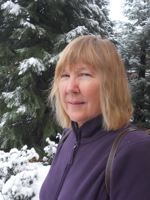
Garter Snake
by Nancy Takacs
Nancy lives in the northern Mesic forest in the Lake Superior watershed of northwestern Wisconsin, catching glimpses of animals who wander from the woods to her native garden.

O snake with a toad in her mouth,
a toad way too big for her,
a toad she has to bloody and numb.
Tomorrow you’ll shed your green skin.
You were on my stone path right out in the open.
I could touch your gold stripe.
I could see how vulnerable
you were, as you crushed
and swallowed.
He was not drawn in easily.
Twice he escaped,
punctured and slathered.
I saw how you let him
come to his senses.
You are the queen of dusk
who disappears in my lavender,
pink foam on your lips.
O snake,
I am your silent partner.
Previously published in Clover
© Nancy Takacs

Sharing the Water with Thoreau
(Walden Pond, The Dead of Summer)
by Daniel Bourne
Daniel lives on one of the small upland ridges between the Funk Bottoms and the Killbuck Marsh, two important bird migration stop-overs along the east/central Ohio corridor. Killbuck Creek, which flows through the Marsh and also gathers the waters from the Funk Bottoms, eventually flows southward into the Walhonding, then the Muskingum, and then the Ohio River.

When arriving at Walden Pond in the dead of summer, as in all seasons, the easy question is WWTT—What Would Thoreau Think? Not what he would do (take a dip in the lake himself or lie down in protest in front of a Range Rover bumper on the dark blue asphalt at the parking lot entrance), but what sort of weather would be taking place inside his head. The easy answer might be to think that he’s outraged to see his precious lake turned into a public swimming hole, but my wife Margaret isn't so sure. She says Henry David was also just a fleeting visitor here, thankful (or at least he should have been) to Ralph Waldo Emerson for the very land on which to build his cabin—just as all the splashers and sprayers around us are beholden to the Emerson family as well. Towards the end of the 19th century, the Emersons (along with the Forbeses and the Heywoods) bequeathed a chunk of land around Walden Pond in trust to the Commonwealth of Massachusetts in order to honor and preserve "the Walden of Emerson and Thoreau, its shores and nearby woodlands for the public who wish to enjoy the pond, the woods and nature, including bathing, boating, fishing and picnicking." To live deliberately might mean to choose a responsible sunscreen, and not the preservation of sooty cabins or sacred cows at all.
And couldn't you imagine Thoreau would applaud the people floating on their backs or pulling on an oar, rather than visiting a museum of old ideas, even if these great truths labeled clearly in the exhibit case were generated by his own inspections of the land? Would he see a mindless herd of cattle confined in a farm pond here, or a polity of self-actualized individuals exercising their spirits along with their bodies?
Last night in the motel in Concord, when I was checking on the internet to see what time Waldon Pond opened up, I came across a website rating various swimming holes of the world. And in this context, Waldon Pond was not at all famous for having once hosted Henry David Thoreau, but that it sported the highest levels of uric acid of any freshwater body in Massachusetts—all because of the hordes of children not just flopping about in its waters day after day, but also going urinating in it. Again, we're talking numbers here, a significant invasive species, day-trippers from nearby Concord and Lexington as well as all the tourists in the area to visit the old stomping grounds of plucky minutemen and consternated redcoats—the numbers of vehicles often high enough to close down the two or three acres of parking lot, the earth made to say asphalt. The Pond's own website warns that you won’t be alone: "To protect the natural resources of the area and ensure that Walden Pond remains a pleasant place for people in the future, the number of visitors is limited to no more than 1,000 people at a time. Dogs, bicycles, flotation devices and grills are prohibited. To avoid disappointment, visitors are encouraged to call the park in advance and check on parking availability."
Even without all the dogs and the bicycles, the beach grills and noodles and floating dragons—and not demonizing too badly the high concentrations of children with indeliberate command of their bladders—we're talking about a type of existential eutrophication of the "Walden experience," the outcome of a lot of like-minded people wanting to do the same thing in a limited amount of space. I'm not trying to be flippant. I've always wanted to link environmental issues to the categorical imperative of Immanuel Kant: if everyone did what you do, would it be a good thing? Indeed, one of the nagging problems I have always had with Thoreau and others who advocate marching to a different drummer is: what would happen if everyone did the same thing, not just in such high numbers, but also within earshot of each other? For Thoreau to go alone to the woods when he did was remarkable. Now it is part of the norm, be it the lazy afternoon of a swimmer or the earnest pilgrimage of a student. (At the same time, is it better or not to have thousands of "re-creators" here on Walden Pond—or have the entire place given over root, stock and barrel to the luxury homes of a privileged few. Or, should only the literati or other suitably deserving personages be awarded the right to come here, an idea that I'm certain would make Thoreau snort coffee from his nose...)
Coming from Illinois, I have always bemoaned the fact that Abraham Lincoln became too famous for his own good, a brilliant and complicated man often turned into a cliché of history. In the same way I fear that Thoreau and Walden Pond are too well-known to ever be truly glimpsed again, that the same historical movements that resulted in the preservation of Walden also contributed to its current destruction. What the one hand gives, the other hand takes away. I think of the Hindi God Kali, both creator and destroyer. We talk about "recreation" bringing about a re-creation of ourselves. But what about re-destruction? What is there in our conscious awareness of the certainty of erasure that makes us want to fix the world in our minds more desperately?
More than nature seems to be under threat, and more than solitude is subject to erosion. You can even see the ongoing process of destruction in the park signage, all of which is rough around the edges, the bottom of the information panels already blurred with moisture and mildew, the words fading away as we read them, some passages hitting a hard slog as if we're on a trail that suddenly disappears into buttonbush swamp or multi-floral briar. Likewise, Thoreau's cabin was soon dismantled after his own stay was done. Even the sign that mentions these facts—how the structure was removed and used to store grain, its timbers taken away for scrap lumber and its roof reincarnated as part of a pig sty-—itself will soon be on its own way out, off to the recycling plant or to a mass internment in some landfill.
But this is economy, not desecration, and I think that Thoreau, rather than gasping and snarling at the numbers of swimmers and joggers, might be more aghast at the heavy marble commemorative stones now laid over the foundations of his long-ago-vanished chimney, might laugh at the efforts made to find the ghostly remains of his experiment in the woods, at how Roland Wells Robbins, not only a Thoreau-devotee but also an archeologist—and thus the only one on this planet who would both bother with and be capable of carrying out such a task, spent an entire three months of digging and scratching before coming across the first tangible clues—the foundation stones of the chimney—on the curious date of November 11, 1945, the day of the year that World War I ended and the year that marked the end of World War II: pure coincidence or a great cosmic sign, given Thoreau's own opposition to governmental violence epitomized in his stay in the Concord jail in protest of the American invasion of Mexico as well as his own mark given on the foreheads of prophets of social justice such as Count Lev Tolstoy or Mah?tm? MohandasKaramchand Ghandi.
The actual site of Thoreau's cabin is relatively shielded from the swimmerly bustle, at the far end of the Pond from the parking lot and beach. Still, the ground around it is hardly the same ground Thoreau would have touched. Even the rocks have changed. Still, I can’t help but be attracted to the large cairn of rocks sprawled nearby the "official" marking of the actual cabin. In Harriet Doerr's novel Stones for Ibarra, I first encountered the notion that one should bring stones to mark a sacred ground, ground on which something has happened, something that must always be remembered. In this I see the reason for graveyards, and that it is the stone in place of the body that is the most important to preserve.
The stones here speak with power. They have been brought here by disciples from all over the world, some without inscriptions, but some with locations as far flung as Russia or India written upon their sides, some with peace symbols and some with various letters of the alphabet representing the names of those bringing these offerings of reverence for H.D.T. Perched on a rather tall pile of stones in the back is a nest, a robin's nest that served its purpose for the robin and now serves its purpose for the man, and I think that maybe Thoreau would be okay with this homage made of twigs, with these fragile stacks of stones, with this trampled little site that tries to keep speaking in his name, that he would even be okay with all the swimmers and vehicles and ranger-guided tours that try to trace his own bushwhacking transits of these woods some 170 years ago, and that he would just shrug his shoulders at the level of urine in the lake or the number of "villagers" ducking in to see the full-size replica of his cabin located so conveniently on the edge of the parking lot on the way to the beach. Why bother to grab up some stone from the pile and try to drive them off? Rather, it is what is in their hearts that ought to be at issue, and how they reveal this content when it is time to reveal. And what of that woman I saw on my way around the lake to the vanished cabin's site, the woman in her brightly colored sari immersed up to her neck in an unpeopled section of the shore, her bare-chested husband waving his hands back and forth slowly in Thoreau’s water as he stares at her face, the flowing ends of her dress bobbing and dipping in the ripples. On dry land, they would both seem to be dancing, and why not think of them that way here in the water just as well, the grace of the man's hands and the woman's cotton-print fabric splashing and swaying.
Yes, this place has been both created and destroyed—loved to death, some would say. Yet there's still an important story going on here, one that deserves to be listened to precisely because we won't ever quite fathom what it means. Babies pee in the lake while grizzle-bearded professors shake their heads in desperation. And who will get their minds around it all? Better just to walk around the pond, or take a deep breath and wade in. The sun is but a morning star, and we are just a story, the beginning and the ending lapping together at the shore. —Concord, Massachusetts, July 12, 2012
© Daniel Bourne

there is no homonym for disappearing, only
by Jordan Osborne
Jordan Osborne lives nestled between the Front Range prairie and Long's Peak in Colorado.

how flame from the campfire hits
cheekbone to frame a face no longer
yours when i can’t see your eyes how
embers crackle and warp and grow
how sparks catch how sparks reach
and catch fallen leaves summer
dry leaves and brush only how light
grows along the foothills like dawn’s rosy
only how light the world becomes
under a thumb when all the water is gone
how light a body without water
becomes and carries itself away how light
the smoke is that chokes to death how light the body
of a smothered possum in the underbrush
how light and how gray and
only how light the humming
and wren who couldn’t fly faster the elk
with antlers snagged in parchment
aspen the dehydrated fox only and how
light the idea of fire becomes when bruised smoke
chokes all the world dehydrated and only
how light the heron on dry banks and the bear
without wild honey only how light the pine
with needles on fire how light and how dry
the forest how light from the campfire touches
your cheekbone frames your face
as a tender thing in the dark and i can tell
your eyes are open how your eyes look
in the light the color of Venus rising to meet
the evening or the sickle of the moon and only
how light our hands must be as we carry the bees
to a distant field only how light the breeze through
the clover when there are no more orange
groves and clover will have to do only how
light the bees lulled to sleep by white white
smoke
title borrowed with thanks from Aricka Foreman’s “Dream Coated in Fluoxetine,” encountered via Alison C. Rollin’s “Cento for Not Quite Love”
© Jordan Osborne
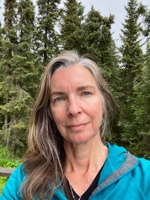
Campbell Creek, August 5th
by Marybeth Holleman
Born near the Cuyahoga River just before it caught fire, raised in the Great Smokies near the rolling waters of the Upper French Broad, Marybeth transplanted to Alaska’s Chugach Mountains after falling head over heels for Prince William Sound—just two years before the devastating Exxon Valdez oil spill changed her life trajectory.

they are there when you stop
and watch clear water’s choreography
across multitude of patterned rock.
rippling length of crimson flashes
in pulsating current, thick as logs
but supple and swaying, the darker
tails waving side to side just enough
to stay in place. red swaths reveal
and disappear, one then another
then a line of five or more strung
like rubies light and dark shadow lilt
with one quick flick red rippling dissipates
then reappears against the shore
or limber in lines along a fallen tree. big
red muscles beating back up what as
fingerlings they each swept down now
the laboring push, the urgent
flame daubed dark swaying curves
tinged now late summer white tips
reminding mountains what will come.
five years of deep sea to return,
arrow-straight swim hundreds of ocean miles,
to this shallow stream fins slicing surface
frosted with their termination dust,
tails singing strong upcurrent as streaming
bodies pull them, fits and starts,
downriver, back to the orchestral sea.
© Marybeth Holleman

Sierra-Gray Moth
by John Schneider
John lives in the Wildcat Creek watershed near Tilden Park in Berkeley, California.

She arrives with the fervor of an unfinished dream.
Drawn to the after-dinner cabin light
the moth returns to a work in progress
tap, tapping—a writer intent at a Smith Corona
her wings chalk the window glass with smudges
like the residue of dreams, blurred figures
left from the all-night twitching of eyelids.
Morning. The writer wakes
to her message—
an outsider hoping to find a way in.
© John Schneider

seeds in flight
Allen, Texas, 2019, waiting for youth baseball
by Corbett Buchly
Corbett abides at the headwaters of the Trinity River on the Blackland Prairie, a nearly flat landscape in all directions. Daily he grounds himself, bare soles against the dark, fertile clay soil.

tufts of poplar seeds
spring up in the hot breeze
as if too light or ardent for rules
purportedly scouting
the most fertile soil not yet claimed
but I can tell by their glib movement
the seeds, like all young in their prime
are flirting with the wind
my blood in those days trained me to reckless acts
sedate and logical were not in the lexicon of body
who knew only mad, headlong movement into longing
fame and oblivion, two points on the same line
but what began as thrust pulled back down by weight
of age and alcohol and attrition of tendon on bone
what counted for danger became tea and a quiet evening under the lamp
as the page struggles to remember
what summer tastes like
and what it means to grab the wind
© Corbett Buchly

factious reptile & witness
by Corbett Buchly
Corbett abides at the headwaters of the Trinity River on the Blackland Prairie, a nearly flat landscape in all directions. Daily he grounds himself, bare soles against the dark, fertile clay soil.

anole bright shooting across the gray worn fence
your tail imprisoned by the lance of a boy’s fingers
snap and twist, your instinct to resist
but the struggle is lost before you’ve begun
and you find yourself surrounded by new world
clinging through the day to the terrarium’s wall
you move only to blink, celestial lethargy
or to snatch the locust in your narrow maws
blinding haste, electric leaps
black-eyed primordial spirit
silent watcher from captivity
the kitchen’s bleak-faced haunt
all night you cling to the aerated roof
long toes splayed in pure paradigm stillness
as if defiance is your natural motion
this evening I discover you hunched
over your cup of water, reservoir
of strength. your eyes closed against the shadow
as if drawing up your will into a battery
of dream and rebellion you are
confined to the deep well
of solitary for the crime of pride
or showmanship neither of which suggest just
cause for possession of the spirit
before breakfast I stare into your small quarters through a rectangle
of dirty plastic, you tilt your head to study
with one black eye
that black speaks struggle without blood
I have no stomach for this stand-off
this division is all heavy sided
you with your baleful eye, black as ache
I with my guilt, white as past
in darkness I slip by slumbering breaths
into the kitchen where you wait, like a thief
I lift your cage into stillness
and carry it into the lawn of clipped grass
I will not wait for death yours or mine
I unhinge the door
without kindness your body says ciao
without words you fly
© Corbett Buchly

Seeing & Believing
by Dan Overgaard
Dan lives on a hill above Puget Sound in an urban watershed supporting salmon migration from the Salish Sea to nearby Lake Washington, Cedar River and many smaller creeks.

Copernicus notwithstanding, the sun rolled
overhead, a hot old stone through smoky skies.
Some primitive shadows fell around, like ash,
and it was hard to breathe. We could not have run
for anything—for a bus, or for our lives.
It was almost archaic, the heavy way
we pushed back from the table, leaving the bones.
Discussion stalled, we paid, and then, emerging
one by one, we looked around, just trying to
absorb all the changes, why we were so stunned—
that not so far away, some worlds were ended.
© Dan Overgaard

Storm Bound
by Nikolas Macioci
Nik lives in the historic village of Groveport, Ohio, where he often walks in Heritage Park somewhere near Lock 22, the original site of Groveport's dry dock and boat yard during the Ohio and Erie canal days. He goes often to nearby Palm's Pond to photograph scenery and wildlife and hikes through the park's wooded area back to the Main Street that leads into this picturesque town.

I'm on the front porch in a rocker,
pumping my feet. Clouds black as giant
bears hang overhead. Thunder makes
the sky sound angry as it blurts out
lightning. Mom's voice behind me
says come into the house away from
danger. My deeper impulse defies her,
and I stay in the rocker. The strobes
of lightning continue to create seconds
of amplified daylight. Like a fist
beating on a sheet of metal, thunder
reverberates and the sky pounds
the ground with a downpour. I linger
on the porch as if tied to the storm
by an umbilical cord that feeds me
its fury. When it stops, a nascent glow
highlights leaves, and a red and yellow
sunset tints whole trees. Birds step out
on branches, and the moon at the opposite
end of the sky slowly rises like something
prehistoric shining its white bones.
© Nikolas Macioci
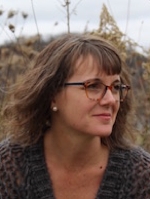
Song for the Pantala flavescens
by Kelly R. Samuels
Kelly lives where the La Crosse River, the Black River, and the Mississippi meet and meld.

Of clear wide wing
and golden body,
the studied eye
of coruscation and skill.
Tireless, steady flight
riding the moist air
to where you feast
on what swarms and pierces
the skin. Aid to, friend
of. Searching
for the bad soul to quiet
the stomping horse.
Globe skimmer wandering
with intent. Of altar, air
and bowl, of the lily’s stem
into which the sun now is banking.
© Kelly R. Samuels
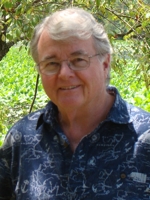
Invasive Species
by Russell Reece
Russell lives in the lower Chesapeake Bay Watershed on a remote tributary of the Nanticoke River, one of the Chesapeake’s healthiest and biologically diverse rivers. The area hosts the northernmost stands of bald cypress on the Atlantic coast and the highest concentration of bald eagles in the northeastern United States.

I’d been watching
off and on
the great white heron hunting
in the marsh
across from my dock.
Shy, skittish
once slaughtered
to near extinction
for their brilliant
white plumes.
I didn’t see them often
and this one’s
patience, elegance,
his otherworldly glow
lulled me
into a state of bliss.
And then,
a deep thumping, pounding
Angry Voice shouting
the bird leaped up and flew
downstream as a ski-boat
burbled slowly past
fiberglass gleaming
stainless steel shining
rap music blaring,
thumping, pounding
dock-chairs rattled
my body tightened
Angry Voice shouting
thumping, pounding
bare-chested boys
in swim-suits drinking,
laughing, playing
thumping, pounding
girls in bikinis
lotion slathering
lipstick glowing
floppy hats blowing
Angry Voice shouting
shouting, shouting
then
the engine roaring
the ski-boat jumping
a wide wake forming
down river flying
quickly disappearing
thumping pounding
no herons hunting
no turtles sunning
no songbirds singing,
just the boat-wake sloshing
lily pads ripping
cattails whipping
beer-cans floating
fragile bank eroding
distant engine whining
thumping, pounding
© Russell Reece